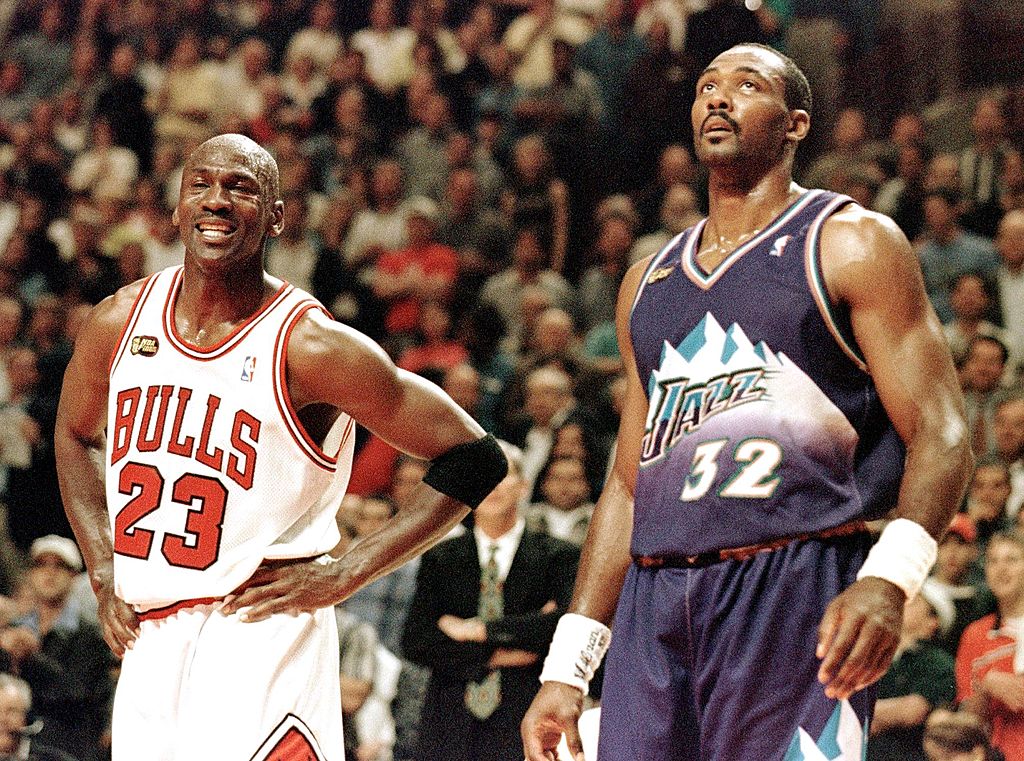NBA
Refs in 1998 NBA Finals Game 6 Blew Numerous Calls in Historic Game

The 1998 NBA Finals Game 6 will forever be remembered for Michael Jordan‘s final series-clinching shot and the end of the Bulls dynasty. That game is also remembered for the officiating. For years Utah Jazz fans and others have sworn Michael Jordan pushed off on his final game-winning shot. While that particular play and non-call will be a never-ending topic of debate, there were multiple times in the game where the refs undeniably missed calls. Egregiously. Here’s a look.
1998 NBA Finals Game 6 first missed call by the refs
RELATED: Hall of Fame Utah Jazz Coach Jerry Sloan’s Health Is Failing According to Karl Malone
With just under four minutes remaining in the first quarter, the refs established their presence when they whistled the Chicago Bulls for a pair of illegal defenses within a couple of minutes of each other. The Jazz were awarded a technical foul.
The broadcast team of Bob Costas and Doug Collins, and the rest of the viewing audience were confused when the referees simultaneously called a technical foul on Utah Jazz head coach Jerry Sloan. What Costas and Collins missed happened just moments before the Bulls received their second illegal defense when Toni Kukoc delivered a forearm to the chest of Karl Malone on the way back down the court that sent the 6-foot-9-inch Malone sliding across the floor.
After Jordan and Jeff Hornacek both converted their respective free throws, Collins said Malone had tried something similar in the previous game on Chicago’s Luc Longley and it was a good non-call. Sloan being saddled with his first technical foul in the first quarter would play a factor later in the first half.
Howard Eisley’s three not counted
RELATED: John Stockton’s Net Worth Is Massive Even Though He Never Won a Ring With the Utah Jazz
With just under 10 minutes to play in the second quarter and the Jazz leading 28–24, Jazz guard Howard Eisley chased down an errant Antoine Carr pass just a couple of feet from the mid-court line and the sidelines. With time dwindling on the shot clock, Eisley grabbed the ball with two seconds remaining, took a couple of quick dribbles, and fired a 3-point attempt from Steph Curry range. The ball hit nothing but net and the crowd erupted.
Referee Dick Bavetta immediately waved it off, ruling there was a shot-clock violation. While there wasn’t instant replay in use by the NBA at the time (that started in 2002), the replay on the broadcast clearly showed Eisley had released the ball before time expired.
“See if the ball isn’t out of his hand. One second…it’s on the way, and they missed the call,” Costas said of the replay. With one technical foul, all Sloan could do was laugh at the call.
Ron Harper’s shot counted after time expired
RELATED: Karl Malone’s First Chance at an NBA Title Was Stolen by Michael Jordan
In the second half, the roles were reversed. With just under four minutes remaining in the contest and Chicago trailing 79-77, the Bulls play broke down and Toni Kukoc frantically passed to Ron Harper with just two seconds left on the shot clock. Harper made a running shot near the right elbow to tie the game.
The replay clearly showed the ball still in Harper’s hands as time expired. After color commentator Isiah Thomas questioned whether or not Harper released the shot in time, Costas described the significance of the two missed calls.
“If they missed that call, it’s a five-point swing in missed calls on shot-clock situations. They took a Howard Eisley three away, wrongly, in the first half. This one was even closer but it appeared that Harper may have been just a fraction of a second behind the shot clock.”
In sports, as much as fans want to blame the refs, the game is never decided by a single play. A game is a collection of plays that must be viewed in their totality including those critical final moments. In Game 6 of the 1998 NBA Finals, the referees didn’t cost the Utah Jazz the game, but they certainly didn’t help their cause.











